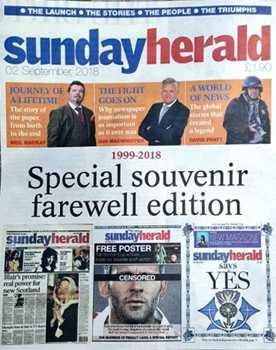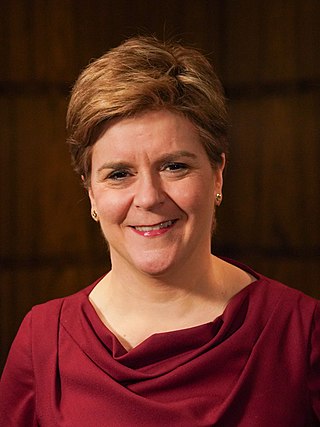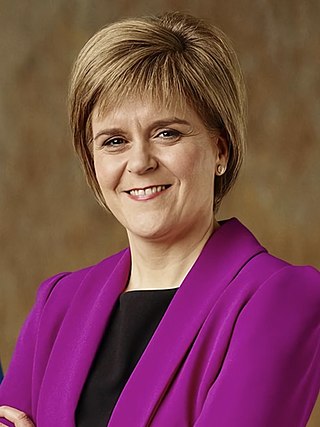
Scottish independence is the idea of Scotland regaining its independence and once again becoming a sovereign state, independent from the United Kingdom. The term Scottish independence refers to the political movement that is campaigning to bring it about.

The Sunday Herald was a Scottish Sunday newspaper, published between 7 February 1999 and 2 September 2018. Originally a broadsheet, it was published in compact format from 20 November 2005. The paper was known for having combined a centre-left stance with support for Scottish devolution, and later Scottish independence. The last edition of the newspaper was published on 2 September 2018 and it was replaced with Sunday editions of The Herald and The National.

Nicola Ferguson Sturgeon is a Scottish politician who served as First Minister of Scotland and Leader of the Scottish National Party (SNP) from 2014 to 2023. She has served as a member of the Scottish Parliament (MSP) since 1999, first as an additional member for the Glasgow electoral region, and as the member for Glasgow Southside from 2007.

Referendums in the United Kingdom are occasionally held at a national, regional or local level. Historically, national referendums are rare due to the long-standing principle of parliamentary sovereignty. Legally there is no constitutional requirement to hold a national referendum for any purpose or on any issue. However, the UK Parliament is free to legislate through an Act of Parliament for a referendum to be held on any question at any time.

Scottish nationalism promotes the idea that the Scottish people form a cohesive nation and national identity.

Unionism in Scotland is a political movement which favours the continuation of the political union between Scotland and the other countries of the United Kingdom, and hence is opposed to Scottish independence. Scotland is one of four countries of the United Kingdom which has its own devolved government and Scottish Parliament, as well as representation in the UK Parliament. There are many strands of political Unionism in Scotland, some of which have ties to Unionism and Loyalism in Northern Ireland. The two main political parties in the UK — the Conservatives and Labour — both support Scotland remaining part of the UK.

Iain Macwhirter is a Scottish political journalist. He is a political commentator for several newspapers, an author and documentary film and radio presenter and a former Rector of Edinburgh University. He has worked at both the UK Parliament and Scottish Parliament, presenting the BBC2 programmes Westminster Live, Scrutiny and, from 1999, the BBC TV programme Holyrood Live from the Scottish Parliament.

A referendum on Scottish independence from the United Kingdom was held in Scotland on 18 September 2014. The referendum question was "Should Scotland be an independent country?", which voters answered with "Yes" or "No". The "No" side won with 2,001,926 (55.3%) voting against independence and 1,617,989 (44.7%) voting in favour. The turnout of 84.6% was the highest recorded for an election or referendum in the United Kingdom since the January 1910 general election, which was held before the introduction of universal suffrage.
Events from the year 2012 in Scotland.
Better Together was the successful campaign for a No vote in the 2014 Scottish independence referendum, advocating Scotland to remain a country of the United Kingdom. The organisation was formed in June 2012, operating until winning the vote on the referendum's polling day on 18 September 2014 with 2,001,926 (55.3%) voting against independence and 1,617,989 (44.7%) voting in favour. In June 2014, the campaign adopted a No Thanks branding, in relation to the referendum question.
This is a list of events in Scottish television from 2014.
Events from the year 2014 in Scotland.

The Scottish Socialist Party (SSP) is a left-wing political party campaigning for the establishment of an independent socialist Scottish republic.
Scotland Decides: The Big, Big Debate was a one-off British television programme broadcast by the BBC on 11 September 2014, a week prior to the 2014 Scottish independence referendum. The 60-minute show was recorded at Glasgow's OVO Hydro during the afternoon prior to broadcast. It was presented by Scottish journalist James Cook before an audience of about 7,500 16- and 17-year-olds, first-time voters on the day of the referendum, some of whom were invited to quiz a panel of prominent politicians from both the "Yes" and "No" campaigns.

The 2014 Scottish National Party leadership election was held to choose the leader of the Scottish National Party (SNP) and First Minister of Scotland, following the resignation of Alex Salmond as first minister and leader. Nicola Sturgeon emerged as the only candidate and was elected unopposed as leader of the SNP.
"Project Fear" is a term that has entered common usage in British politics in the 21st century, mainly in relation to two major referendum debates: the 2014 Scottish independence referendum, and then again during and after the 2016 UK referendum on EU membership (Brexit).

A second referendum on Scotland becoming independent of the United Kingdom (UK) has been proposed by the Scottish Government. An independence referendum was first held on 18 September 2014, with 55% voting "No" to independence. The Scottish Government stated in its white paper for independence that voting Yes was a "once in a generation opportunity to follow a different path, and choose a new and better direction for our nation". Following the "No" vote, the cross party Smith Commission proposed areas that could be devolved to the Scottish Parliament; this led to the passing of the Scotland Act 2016, formalising new devolved policy areas in time for the 2016 Scottish Parliament election campaign.
Opinion polling on Scottish independence is continually being carried out by various organisations. This article concerns the nearly 300 polls carried out since the 2014 Scottish independence referendum. Polling conducted before the referendum can be found here. Polls listed here, except as noted, are by members of the British Polling Council (BPC) and abide by its disclosure rules.
Bella Caledonia is an online magazine publishing social, political and cultural commentary. It was launched in 2007 and came to particular prominence during the campaign period of the Scottish independence referendum that was held in 2014. The site is not affiliated to any political party. Until late 2017, it also produced a 24-page print magazine which appeared as a supplement in The National on the first Saturday of every month.









